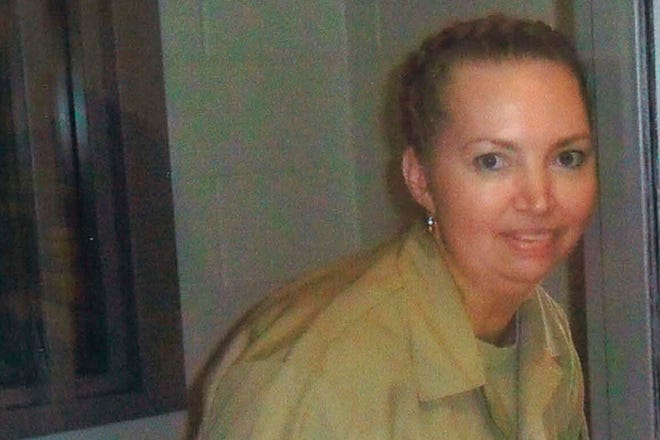
TERRE HAUTE, Ind. — After a flurry of last-minute court orders, hours of uncertainty and one final plea to reconsider her competency, Lisa Montgomery became the first woman executed by the federal government in 67 years early Wednesday.
Montgomery, 52, was executed by lethal injection at the U.S. Penitentiary in Terre Haute. Her time of death was 1:31 a.m., seven and half hours after her originally scheduled time of execution, according to the Associated Press.
As both sides filed appeal after appeal to tip the scales in their favor, Montgomery spent her final moments in a cell within the brick execution building just steps away from the execution chamber.
The U.S. Supreme Court cleared the way for Montgomery’s execution with a pair of orders issued just before midnight.
The high court lifted a stay of execution put in place by U.S. Court of Appeals for the Eighth Circuit and rejected a final stay application from Montgomery's lawyers.
Kelley Henry, Montgomery's federal public defender, expressed her disappointment in the day's events, saying the federal government violated the Constitution, federal law and its own regulation to put her client to death.
“The craven bloodlust of a failed administration was on full display tonight. Everyone who participated in the execution of Lisa Montgomery should feel shame," she said in a statement provided to IndyStar of the USA TODAY Network after midnight.
"Our Constitution forbids the execution of a person who is unable to rationally understand her execution," Henry said. "The current administration knows this. And they killed her anyway."
Montgomery's attorneys have said she endured severe physical and sexual abuse beginning in her childhood, and that she suffers from serious mental illness. Late Monday night, U.S. District Court Judge Patrick Hanlon granted a stay to halt the execution, citing the need to determine Montgomery’s mental competence, according to attorneys.

Tuesday’s legal battles began when the U.S. Court of Appeals for the Seventh Circuit declined to stay her execution less than 24 hours after a federal judge in Indiana granted a stay in her execution over concerns about her deteriorating mental health.
On Tuesday afternoon a judge with the U.S. Court of Appeals for the Eighth Circuit granted another stay, throwing Montgomery's execution further, into question.
Around 8 p.m., the high court lifted the stay issued by the U.S.Court of Appeals for the District of Columbia, but the Eighth Circuit stay remained in place until the near-midnight decisions by the Supreme Court.
The Supreme Court repeatedly split along partisan lines, with liberal Justices Stephen Breyer, Sonia Sotomayor and Elena Kagan ruling in ways that would have granted Montgomery a reprieve.
By Tuesday afternoon, that stay had been undone. Three judges with the higher appeals court reversed Judge Hanlon's order, saying that Montgomery's attorneys waited too long to bring their request for an execution stay to federal court. They also said that declarations attorneys used from three experts about the state of Montgomery's mental health relied on outdated information. Two of the experts had last seen Montgomery in 2016, and the other last saw her in 2010, according to the judges.
In 2004, Montgomery drove from her Melvern, Kansas, farmhouse to the northwest Missouri town of Skidmore under the guise of adopting a rat terrier puppy from Bobbie Jo Stinnett, a 23-year-old dog breeder. She strangled Stinnett with a rope before performing a crude cesarean and fleeing with the baby.
There are two more outstanding petitions in Montgomery's case that could still alter her fate.

On Dec. 24 Montgomery’s lawyers asked Trump to commute her death sentence to life in prison without parole. In their clemency petition, they describe the severe trauma that shadowed Montgomery's childhood, and allege that she was not effectively represented by lawyers who first took on her case after the crime was committed.
On Jan. 9, Montgomery's lawyers submitted a petition to the U.S. Supreme Court asking that the justices stay her death sentence. The petition is an appeal of an earlier case out of the U.S. District Court for the District of Columbia, where the court ruled that the federal government acted against regulation when it scheduled Montgomery's execution for Jan. 12 despite an outstanding court order staying her execution.
That ruling fell apart after the U.S. Court of Appeals for the District of Columbia Circuit reversed it, prompting Montgomery's lawyers to now take it up with the Supreme Court.
Two other executions set for later this week also were halted because the inmates tested positive for COVID-19. The executions were to be the last before President-elect Joe Biden, an opponent of the federal death penalty, is sworn-in next week.
A federal judge for the U.S. District of Columbia halted the scheduled executions later this week of Corey Johnson and Dustin Higgs in a ruling Tuesday. Johnson, convicted of killing seven people related to his drug trafficking in Virginia, and Higgs, convicted of ordering the murders of three women in Maryland, both tested positive for COVID-19 last month.
Montgomery is just the third woman executed by the federal government since 1900. She joins Bonnie Brown Heady who was put to death in a gas chamber in December 1953 for her role in the kidnapping and murder of a multi-millionaire auto dealer’s 6-year-old son; and Ethel Rosenberg who was executed in June 1953 for trying to deliver war secrets to the Soviet Union.
Women have accounted for less than 4% of the nearly 16,000 executions carried out in the United States since the 1600s, according to the Death Penalty Information Center.
Contributing: Rafael Garcia, Topeka Capital-Journal; The Associated Press.
Contact IndyStar reporter Elizabeth DePompei at [email protected]. Follow her on Twitter: @edepompei.
Source link







